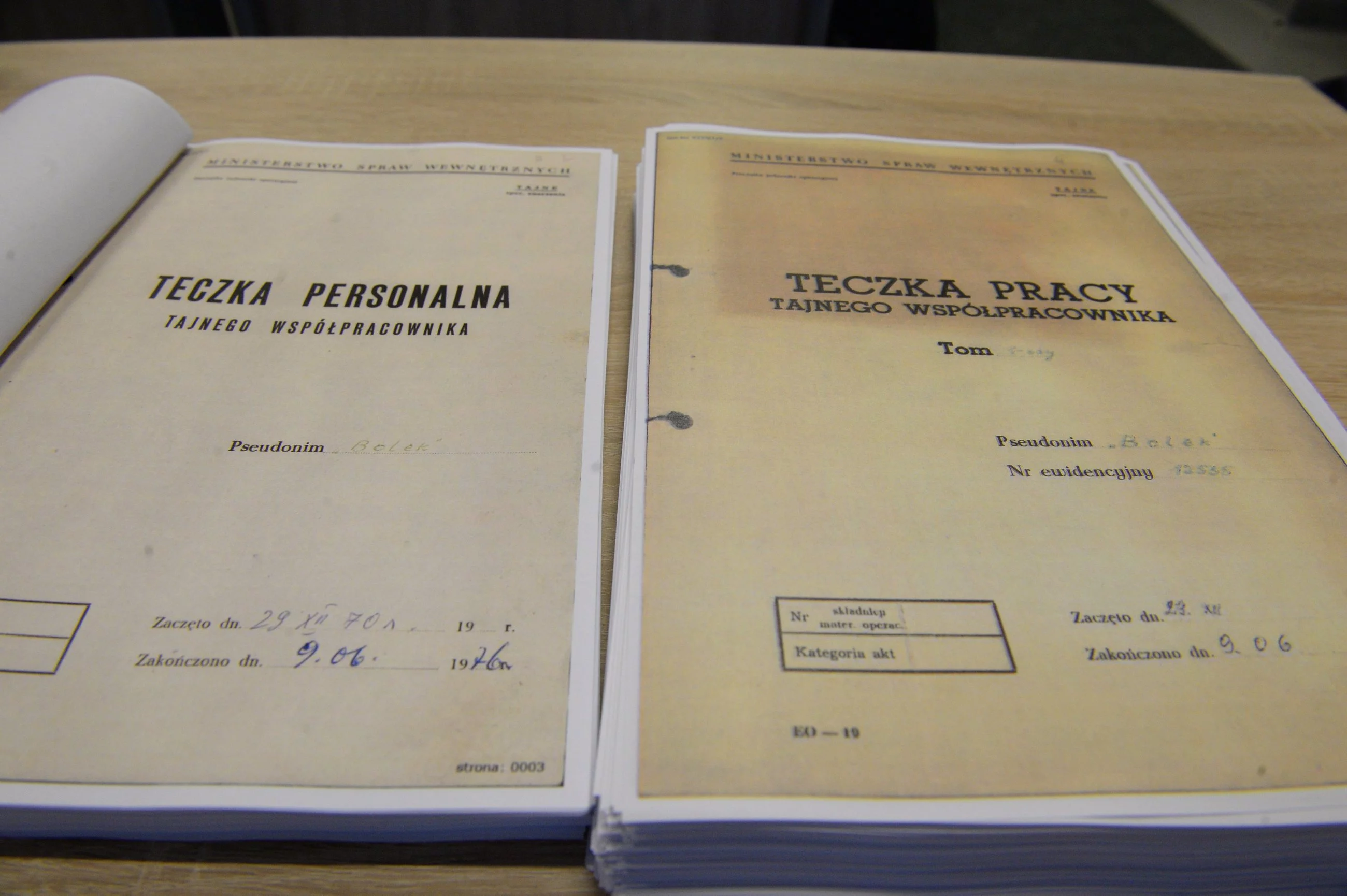Description of the facts
The territory Court of M., having examined and taken into account the request made by the territory lawyer in G. under Article 335(2) of the NCP, found the suspect by judgement of 14.3.2024, II K 27/24, D.B. for a criminal offence of Article 202 §4a of the KK, for which he fined 200 regular units of PLN, for a criminal offence of Article 200 §1 of the KK, Article 200 §4 of the KK, Article 202 §4 of the KK, in accordance with Article 11(2) of the KK, for which he sentenced the year of imprisonment, and for an offence of Article 200a §2 of the KK, Article 200 §4 of the KK and Article 202 §4 of the KK, in accordance with Article 11(2) of the KK, for which he sentenced the six months of imprisonment. Pursuant to Article 91(2) of the CCC, he combined the above-mentioned prison sentences (judged with an exceptional leniency) and sentenced the accused individual to a full punishment for the year of imprisonment, the execution of which he suspended conditionally for a period of 5 years of trial, giving up the accused during the trial under the supervision of the probationary officer. Pursuant to Article 41(1a) of the CCC, he ruled against the suspect a criminal measurement in the form of a prohibition against the suspect from taking up any position, performing any business or activities related to the upbringing, education, treatment or care of minors for a period of 3 years.
This judgement was not contested by either organization and was finalised on 22.3.2024 without appeal.
The cassation of that judgement was brought by the lawyer General, who appealed it in its entirety to the detriment of the defendant, alleging a gross and materially affecting the content of the judgement in breach of the criminal law of the procedural procedure, namely Articles 343 §6 and 7 of the NCPs in Article 335 §2 of the NCPs, by not taking into account the incorrect application of the prosecutor and issuing to the D.B. a conviction for 2 offences and a prohibited act, qualified under Article 200(1) of the KK and others, although:
- Whereas the application for a full punishment of 1 year of imprisonment, which has been conditionally suspended for a period of 5 years of probation, which has been imposed in lieu of individual prison sentences of 1 year and 6 months, has been formulated in contravention of Article 91 (2) of the CCC in conjunction with Article 86 (1) of the CCC, resulting in the issuing of the judgement under appeal with gross and material law having a crucial impact on its content, in connection with the imposition of a full custodial conviction below the lower limit of that penalty;
- the request contained a proposal for a ruling only one the criminal measurement referred to in the second conviction of Article 41(1a) of the KK22, in force until 30.9.2023, and after that date Article 41(1a)(2) of the KK, even though the suspect has been convicted 3 times for offences against sexual freedom or morality against minors, resulting in the issuing of the judgement under appeal with a gross and materially affecting content of the said substantive law, consisting in a one-time judgement against D.B. a criminal measurement in the form of a prohibition against any or circumstantial posts, the pursuit of any or circumstantial professions or activities related to the upbringing, education, treatment or care of minors, whereas, in accordance with Article 41(1a) of the KK22 (update Article 41(1a)(2) of the KK), a judgement of that prohibition in respect of each of the 3 consecutive convictions, followed by a judgement against the accused, pursuant to Article 90(2) of the KK, of the combined criminal measurement was mandatory.
By raising the above, the lawyer General requested that the judgement under appeal be abrogated and that the case be referred to the territory Court of M. for review.
Supreme Court D.B. convicted of the acts referred to in Article 202 § 4a of the KK and Others, after having been heard on 25.9.2024 in the Criminal Chamber at its sitting under Article 535 § 5 of the NCP of the cassation brought by the lawyer General against the judgement of the territory Court of M. of 14.3.2024, in Case II K 27/14, pursuant to Article 537 § 1 and 2 of the NCP, annulled the judgement under appeal and referred the case to the territory Court of M. for review.
Reasons for SN
According to the ultimate Court, the nature of the deficiencies had the power to take account of the cassation in full under Article 535(5) of the NCP.
The author of the cassation correctly pointed out that the combined conviction in the contested judgement did not fall within the limits of its permissible shape. In view of the degree of the individual prison sentences ordered by this judgment, the combined punishment is lower than the lower limit of its possible judgment. As a general rule, in accordance with Article 86(1) of the KK in conjunction with Article 91(2) of the KK, the court shall impose a full punishment within the limits above the highest of the penalties imposed for individual offences to their sum. In the present case, the highest combined unit punishment was the year of imprisonment. Therefore, the lower limit of the combined punishment was 1 year and 1 period imprisonment. The territory Court, therefore, by ruling it on a lower level (year), committed a gross violation of substantive law, namely the disposition of Article 86(1)(KK) in conjunction with Article 91(2) KK. It besides requires that the lowest possible cumulative penalty, i.e. 1 year and 1 period imprisonment, did not meet the statutory condition for the application provided for in Article 69(1) KK, of the advantage of conditional suspension of enforcement. This institution, starting with the amendment of the Criminal Law, which entered into force on 1.7.2015, is only intended for prison sentences of up to 1 year.
Without doubt, the territory Court has besides committed a failure to regulation on a criminal measurement under the second conviction of Article 41(1a) of the KK22 in force until 30.9.2023 and after that date Article 41(1a)(2) of the KK. Although that court ruled the measurement in question, the suspect was so in fact deprived of the chance to take up the employment and business referred to in Article 41(1a) of the KK22, but did so once, even though D.B. has been convicted of 2 consecutive offences, namely those referred to in Article 202 §4a of the KK and Article 200 §1 of the KK, Article 200 §4 of the KK and Article 202 §4 of the KK in conjunction with Article 11(2) of the KK, as well as the offence referred to in Article 200a §2 of the KK, Article 200 §4 of the KK and Article 202 §4 of the KK in conjunction with Article 11(2) of the KK, which are included in the catalogue of prohibited acts, the subject of which is the sexual freedom of the minor. Consequently, the second conviction of Article 41 § 1a of the KK22 (currently Article 41 § 1a(2) of the KK) should apply in connection with the conviction D.B. for each of the incriminated behaviors, or 3 times. The absence of these mandatory individual decisions in the contested judgement constitutes a serious breach of substantive law. Subsequently, under the conditions of appropriate disposition of Article 90(2) of the KK, The court should have combined the prohibitions in question, which are generically the same, and ordered the combined means of the camp.
It is clear that the above errors were the consequence of the acceptance by the Court of First Instance of a defective application made by the Prosecutor pursuant to Article 335(2) of the NAP. It is the work of the court ruling under Article 343 of the NCPs in accordance with Article 335 of the NCPs to review the prosecutor's application both formally and in substance. In the context of the re-examination of the case, by complying with the work to review the application submitted under Article 335(2) of the NCP, The territory Court should either grant the accused consent to a full punishment ruling higher than that imposed by a defective judgment, which will, however, prevent simultaneous application to D.B. the benefits of conditional suspension of the execution of the full conviction of imprisonment, or the Court of First Instance should point out the request to modify the application by reducing the individual conviction of imprisonment, so that the combined punishment can be decently ruled on in the same way as in the judgement under review, to which the prosecutor may refuse to consent. Similarly, the question of a criminal measure, as provided for in the second conviction of Article 41(1a) of the KK22 (currently Article 41(1a)(2) of the KK), besides requires a possible agreement.
Comment
Background to the case in question is the uncontested claim that the suspect is being punished correctly, which par excellence it is not that simple. Well, no uncertainty it will require changing the defendant's position and the prosecutor's. However, for apparent reasons, it cannot be excluded that these consents will not be obtained by the Court. As a consequence, it will face the request to examine the case on a general basis. In this situation, the decision to revoke the contested decision in its entirety proved to be justified.
Judgment of the ultimate Court of 25.9.2024, IV KK 251/24, Legalis
















